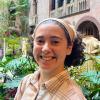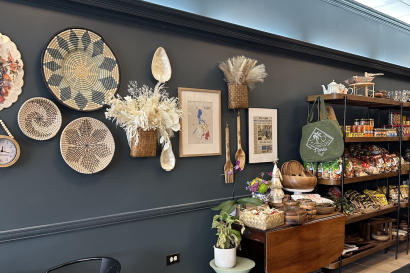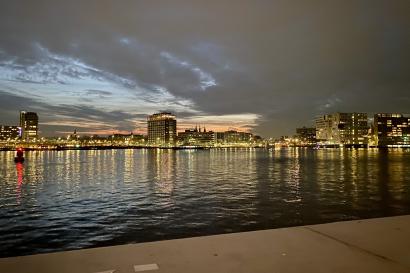I’ve heard this phrase a lot lately, that “I’m on a ‘once in a lifetime’ opportunity”. As grateful as I am to be on this journey – one that I would not have been able to embark on without the gracious assistance of wonderful, loving people in my life – I have to politely disagree. The idea that studying or living in a foreign country is ‘once in a lifetime’ is limiting, and ideally in my case, also inaccurate.
Events are only ‘once in a lifetime’ if you make them that way.
I fully intend on coming back to Amsterdam in the future. It’s a beautiful city with quirks that I greatly admire: wonderful food (but really, just the Surinamese food is the absolute best), too much rain, the most charming buildings, easy bike accessibility, and tons of diversity. Amsterdam has provided a stark contrast to my usual Midwestern surroundings of corn fields, bitter cold, awful Italian food, and hot dishes… “don’t cha know?”. (For those of you that aren’t aware, don’t cha know is just one of the many Midwestern phrases where the accent comes through strongly).
In all fairness, every place has ups and downs. The diversity of people in Amsterdam is something that I don’t have in Wisconsin, which is home to the most segregated city in the United States (Milwaukee) and is overwhelming made up of a white, middle- or working-class, conservative, and/or hunting community. Obviously, this doesn’t describe everyone, but it’s important to note this demographic is very represented while others are overwhelmingly underrepresented.
The component about study abroad that I refuse to be 'once in a lifetime' is learning about diverse cultures, becoming aware of how my identities function differently in different places (e.g. being American), and debunking stereotypes.
Prior to studying abroad, I was convinced that Amsterdam was the gay capital, a haven of tolerance. Or, as Bill O'Reilly depicts Amsterdam as overun with drugs, prostitution, organized crime, and mentions of gun violence (??? Bill, that's just not true. See for yourself: https://www.youtube.com/watch?v=RLJ56BfPoSg). However, tolerance, as much as the Netherlands market it as “the” defining characteristic of Dutchness, falls short when referring to immigrants and Muslims.
Which brings me to a troubling observation I’ve made while studying here. The rhetoric about immigrants, refugees, and Muslims is analogous to the rhetoric of the US President-elect. Ethnicity and race operate differently in Europe than the States, there’s no doubt about that. However, the speech about Moroccans, Muslims, and other immigrants to the Netherlands is also fear-laden and hateful. In the political spectrum, Partij voor de Vrijheid (PPV; “Party for Freedom”) and Geert Wilders’ stances on immigration and Islam exemplify this point.
Through my academic courses, encounters with Dutch friends, social media, and personal observations, it’s clear that when there is an issue in the “typical Dutch” discourse, the blame is hastily passed onto immigrants as people who aren’t acclimating or compatible with “Dutch tolerance”. This is specifically true for issues surrounding gay rights and hate crimes. Blame is passed onto this demographic because they are “bringing problems”, the immigrant and Muslim “others” that oppose white Dutch “tolerance”. This is a wonderful write up from the perspective of a Dutch-Moroccan living in Amsterdam: http://www.huffingtonpost.co.uk/mohadesa-najumi/dutch-racism_b_9659886.html. I also recommend this article by on anti-gay violence under the Dutch “tolerance” framework: http://www.jwduyvendak.nl/wp-content/uploads/2015/07/as-long-as-they-keep-away-from-me.-2011.pdf.
The paradox of living in a country that prides its national identity on tolerance and multiculturalism and, in the same breath, will claim that Muslims and immigrants are causing all of the Netherlands’ ails is baffling.
This conversation is a difficult and complicated one to have. Just as with every identifying characteristic someone could have: religion, race, ethnicity, gender, class, ability, there are people who will not always agree with you, who will commit hate crimes or terrorism. No “identity” is exempt from these behaviors.
I know many of you may not agree with me. It’s really easy to try and solve an issue (in Amsterdam, anti-gay violence) by blaming a people who “seemingly” oppose (Muslims). Tolerance/non-tolerance. Dutch/Other. Muslims come in all shapes and sizes: https://www.youtube.com/watch?v=KvJDZoGdDF0, https://www.youtube.com/watch?v=JMQjyRc7eiY.
Hopefully, if anything, this got you thinking consciously and critically. And, as always, I appreciate any responses, questions, or criticisms. One of the first steps towards combating against hate speech, unfair generalizations, and race- or ethnicity-based discrimination is to start a conversation.
Tot ziens!

Shana Pike
<p>Hello folks! I'm Shana, a small-town tree-hugger with a big appetite for experiences, culture, and knowledge. I'm an undergrad student of Psychology and Gender Studies, yearning to understand my surroundings better each day. Welcome to my conglomeration of ideas and passions, all nourished by traveling, friends, spinach, and coffee.</p>







